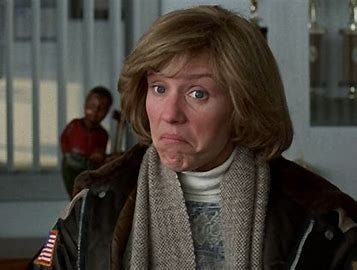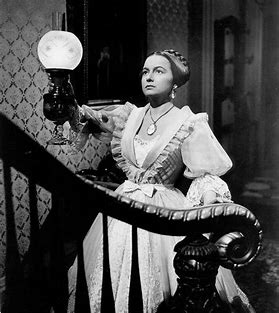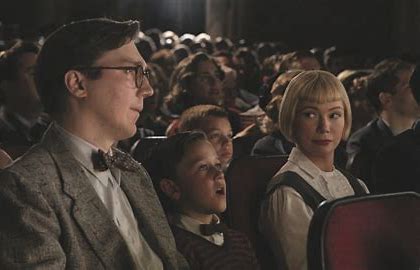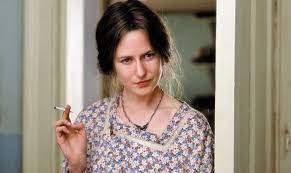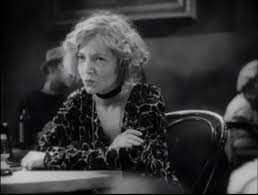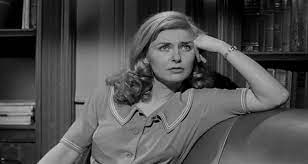We are inching ever closer to my top 20.
In this volume, I think you can see that I shift more towards a sense of reverence in how I feel about many of these performances...especially as we reach the 20s.
Let's get into the list and I will leave the rest of my thoughts for the end.
_____________________________________________
#40 - Holly Hunter, The Piano (1993)
I feel like Holly Hunter's win for The Piano has aged rather well for myself and a lot of other critics...but I am still not entirely sure she should've won. I am more inclined to think that Angela Bassett should've won for her truly iconic turn as Tina Turner in What's Love Got to Do With It? or Stockard Channing for duplicating her stage performance of Ouisa in John Guare's Six Degrees of Separation.
Much like Hunter's performance, I have also grown more fond of The Piano as I found it to be an obtuse bore when I saw it as a teenager. I consider it to be a truly haunting film these days and feel that Jane Campion's work on it was truly masterful.
Hunter doesn't speak in the film aside from narration...so the performance relies solely on her expressions. I feel like she does manage to succeed with what she is handed, but I often found myself more drawn to her younger co-star Anna Paquin (Oscar winner at 11 years old) who had such a fascinating screen presence and would often steal scenes.
It is nice to see Hunter getting an Oscar though, especially after losing for her magnificent breakout performance in Broadcast News 6 years earlier.
__________________________________
#39 - Ellen Burstyn, Alice Doesn't Live Here Anymore (1974)
Ellen Burstyn is another example of an actress who deserves an Oscar on her mantle and she managed to get it for a good performance...though not her best...and not the best in her category.
Burstyn managed to rebuild her legacy with younger moviegoers with her role as Sara Goldfarb in Requiem for a Dream, which might be the best performance of her career.
Her role of Alice mostly seems overshadowed these days by the fact that this story would be adapted into a sitcom starring Linda Lavin.
Not to mention that this is the infamous year in which Ingmar Bergman's Scenes from a Marriage was deemed ineligible for the Oscars as it had originally been a miniseries in Sweden...which meant Liv Ullman couldn't compete.
Even without Ullman, this category still had an actress giving one of the greatest performances EVER captured on film: Gena Rowlands in A Woman Under the Influence.
Trying to put aside my massive admiration for the snubbed Ullman and the ferociously brilliant Rowlands, I can commend Burstyn's work here as being feisty and memorable...and hey, ranking her at #37 is certainly nothing to scoff at.
It is a vibrant performance and I think had the film come out the following year, she would've been an easy sweeper.
_________________________________
#38 - Barbra Streisand, Funny Girl (1968)
Streisand's win is simply due to the fact that she, more than likely, voted for herself.
Despite Funny Girl being her feature film debut and Academy protocols normally stating otherwise, the Academy President and Oscar winner Gregory Peck had pushed strongly (and honestly wisely) for new changes in Academy membership...especially in favor of fresh new blood.
With this in place, we managed to get our first and so far ONLY legit tie in an acting race (the 1931 Best Actor race was not a true tie).
Streisand tied with Katharine Hepburn in The Lion in Winter (spoiler alert: you won't see her til the next and final volume), who had just won the year before for Guess Who's Coming to Dinner? and now had 3 Oscars.
One of the things that greatly bothers me about Streisand in this film is something that Streisand herself has called out...and that is, I find her often to be a lot less engaged during songs when she is being made to lip-sync.
The vocal performance is obviously stellar, but the visual performance often feels disconnected...and THANKFULLY, she knew this so well that she insisted to William Wyler that first portion of "My Man" be done live and have that blend into a pre-recorded performance.
The results of the lip-sync in that particular case are marginally more successful with the emotion already set in place...but even then, it does slip for me slightly.
It is a performance that is hurt mostly by filming conventions, but whenever she does overcome it, she is truly exceptional.
___________________________________
#37 - Julianne Moore, Still Alice (2015)
____________________________________
#36 - Jessica Chastain, The Eyes of Tammy Faye (2021)
We are quickly approaching awards season as I write this post, but as of this exact moment, Chastain is our most recent winner...and it is a win that both baffles me and makes me happy.
Last season's Best Actress race was all over the map. For a while, it seemed like Kristen Stewart was on track to win for her work as Princess Diana in Spencer, despite how divided many were on her and the quality of the film.
Then, when she managed to lose the Golden Globe and got snubbed at both SAG and BAFTA, it more or less erased her chances.
While this was all going on, Lady Gaga was doing the rounds to promote House of Gucci and making it known that she took a lot of method classes to the point where it just became a joke. Briefly, it seemed as though she was going to be the frontrunner when she was the only main contender to get nominated at every major precursor...only for her to get snubbed at the Oscars.
Quietly and stealthily, Jessica Chastain crept through the season despite the fact her film was a bomb and got middling reviews. She managed to win the SAG along with the Critic's Choice Award (which simply seemed like them doing their usual copycat routine because if they really were to represent the critics, then Stewart would've won there).
Chastain's performance got mocked by some as being hammy and brash.
Ummm....have people totally forgotten what Tammy Faye-Bakker-Messner was like as a person?
She was loud, she was emotional, she was passionate, and she wore lots of eye makeup and bronzer.
Sure, lily-white Chastain may have been buried under a ton of makeup and fits the bill of a cliche Oscar winner from a biopic but despite the film's sluggish quality, I think she did a very good job at capturing the spirt of this truly interesting woman.
It also doesn't hurt that Chastain is an actress who was truly overdue for this kind of recognition, so her having an Oscar does make everything seem right.
Of the nominees, I might've been inclined to vote for Penelope Cruz for Parallel Mothers.
Of the snubbed contenders, we have a few women who were far more worthy than most of the nominees:
Renate Reinsve, The Worst Person in the World
Tessa Thompson, Passing
Anamarie Vortolomei, Happening
Martha Plimpton, Mass
Tilda Swinton, Memoria
______________________________________
#35 - Glenda Jackson, Women in Love (1970)
#34 - Shirley Booth, Come Back Little Sheba (1952)
#33 - Louise Fletcher, One Flew Over the Cuckoo's Nest (1975)
#32 - Jane Fonda, Klute (1971)
#31 - Frances McDormand, Fargo (1996)
For her 1st win (already discussed the third and we still have the 2nd win coming), I think McDormand achieving a victory for Fargo is one of the more inspired wins in Oscar history.
On one hand, even though Marge Gunderson is a major and pivotal character in Fargo, she almost feels like a supporting character in terms of screen time...which is even more baffling when you consider that her co-star William H. Macy was nominated for Supporting Actor and is arguably the real lead of the film.
The kind of thing happens all the time, so I will just let it go. It is a topic for another time.
Marge Gunderson is a perky and quirky sheriff of a small Minnesota town. She is happily married and approaching the due date of her first child.
With a thick Minnesotan accent and truly charming screen presence, it is hard to avoid using a word like "iconic" when discussing this performance.
Considering the fact she beat very dramatic performances by the likes of Brenda Blethyn, Emily Watson, and Kristin Scott Thomas, I can't help but feel like this is a rare example where the Oscar voters embraced a quirky indie favorite at the expense of a more bombastic or dramatic performance.
Having said that, I am still not sure I would've voted for her in this lineup. Of the names I mentioned above, both Blethyn and Watson would battle it out for my vote.
Strangely enough, much like McDormand, I think Kristin Scott Thomas was more Supporting than her winning co-star Juliette Binoche. It felt like Bincohe and Macy were more lead than McDormand and Thomas were.
Nevertheless, I celebrate this win because it does feel truly unique.
_____________________________
#30 - Geraldine Page, The Trip to Bountiful (1985)
My introduction to Geraldine Page was her voiceover work as Madame Medusa in one of my favorite Disney movies of all time: The Rescuers.
As a kid, there were certain performers I had such a strong attraction to for their work that I would often ask my mother about them, and I can distinctly remember being very entranced by Page simpy due to her voice alone.
When I got older, I discovered her work in other films. In Woody Allen's Interiors, a movie which is in a constant battle from being pretentious and intriguing, Page's Eve is a neurotic mess that becomes so compelling to watch...and I am convinced that in a lesser actress' hands, that role would've been a colossal failure.
She was also splendid in films like Summer & Smoke and in lighter fare like Pete n' Tillie.
Nowadays, we hear about actresses like Amy Adams who have yet to win an Oscar, but it took Geraldine Page until her 8th nomination to win.
Many film buffs will debate whether this Oscar was deserved, especially due to the fact she beat Whoopi Goldberg in her iconic debut role as Celie in The Color Purple.
I am torn. I don't care as much for The Color Purple, but Goldberg was splendid in it.
When it comes to Page, I can't say that The Trip to Bountiful is a remarkable movie, but I think she equally as splendid in other ways.
There is a scene closer to the end of the film when Page is at a bus depot and it looks as though her journey back to see her childhood home is about to be thwarted and she starts to cry.
When watching this scene for the first time, I immediately said "Okay, she deserved this".
I think Goldberg and Page were both worthy.
As for some snubbed contenders that year:
WHERE IN GOD'S NAME WAS CHER IN MASK?!?!
Also, a quick shoutout to Mia Farrow in The Purple Rose of Cairo and Norma Aleandro in The Official Story.
______________________________
#29 - Michelle Yeoh, Everything Everywhere All at Once (2022)
-
When Michelle Yeoh stepped onto the stage at the 95th Annual Academy Awards, I was thrilled...and the honest truth is that it might be one of the best examples of me being equally happy for someone even if I may have voted for one of their competitors.
In the grand scheme of things, I did prefer Cate Blanchett's performance in Tar. However, there is no denying how much passion and warmth and all-around badass energy Michelle Yeoh brought to the table.
As someone who has been a big fan and champion of Asian cinema for most of my life, I am also thrilled that we FINALLY have an Asian performer winning in Lead.
Yeoh became only the second woman of color and first Asian woman to win a Lead Oscar...and it has been 21 years since Halle Berry stood on that same stage accepting the honor. It is crazy to think it took this long considering that since then, we've had Denzel Washington, Jamie Foxx, Forest Whitaker, and Will Smith all win in Lead Actor.
This was a performance that managed to feel right in line with so many compassionate Best Actress winning roles...but it also felt so unique at the same time.
I might not have been as enamored with the film as many others were, but there is also a lot to admire about the film...and I think Yeoh is MAJOR driving force behind that.
_______________________________________
#28 - Hilary Swank, Boys Don't Cry (1999)
The 72nd Annual Academy Awards were essentially viewed as the coronation ceremony for American Beauty. The amount of praise and adoration that movie received at the time still, to this day, feels as strong as any movie to have come out in my lifetime. What makes it all the more remarkable is how much that adoration has waned in recent years...and perhaps I am biased because I have never found that movie to be the masterpiece that many claimed it was.
I bring up American Beauty because going into that ceremony, many expected it would become the 4th film to sweep the Big 5 Oscars: Picture, Director, Screenplay, Actor, and Actress.
It got the first 4, but Annette Bening lost Actress to Hilary Swank for Boys Don't Cry.
At the time, this wasn't exactly an upset. It seemed very possible that it would occur, and looking back on it, the transformation angle fits squarely into the Oscar winner motif.
I actually feel Swank was the better choice and I also think Swank has never managed to find the kind of role to showcase this kind of talent again...and yes, I say that knowing full well that she won a second Oscar...and if you recall, I didn't exactly rank that win too high.
Boys Don't Cry is a brutal movie. It is not an easy watch. I recently made a comment about the movie Till and how I felt that maybe a movie dealing with a truly horrendous racial crime didn't need to be made. Did we also really need to see this trans man get brutally assaulted and murdered?
That is always going to be a major debate.
You also have the fact that they cast a cis woman to play a trans male...but looking past that, I feel like the manner in which Swank committed to the part is truly commendable.
I do want to acknowledge a major snub in this category though, because I still think that Reese Witherspoon was utter perfection in Election.
Rhyme pun not intended.
______________________________
#27 - Liza Minnelli, Cabaret (1972)
This win by Liza Minnelli is a prime example of how something can simultaneously be both well-deserved and a mixed bag all at once.
I think Cabaret as a movie also aptly fits a similar description, because it is truly its own beast compared to its source material.
Despite the darker edges of the film, it loses a lot of its luster compared to the Tony Award winning stage production that had opened on Broadway six years prior...particularly how it handled the subtext of the relationship between Minnelli's character Sally Bowles and her lover Cliff (Michael York)…not to mention the erasure of subplots involving Fraulein Schneider and Herr Schultz.
So the film might be great in its own right, but it is also very different in terms of its final product. Within the world of the film, Minnelli shines and is truly wonderful.
However, a lot of the dramatic weight that is often brimming under this character is lost. This is especially apparent after you watch other interpretations by such actresses as Natasha Richardson, Jessie Buckley, or Amy Lennox.
As a song, the titular number sounds cheerful and reads as cheerful but in the stage show, it comes along at a crucial moment where Sally performs it but realizes that the life she thought she wanted was a shame and that she would rather abort the baby she is pregnant with and resume a life of "pills and liquor".
In the movie, the song basically reads exactly as the lyrics suggest. Perhaps it is unfair, but this is what makes me feel like I can fully embrace the performance as my favorite of that year.
She may have been more supporting but I did adore the nominated work of Cicely Tyson in Sounder and also Liv Ullman in The Emigrants, one of the few times she made a mark in the US not making an Ingmar Bergman film.
___________________________________________
#26 - Brie Larson, Room (2015)
I do find it to be a very good movie and one that was highly emotional, but perhaps it was slightly overhyped for me.
I do support this win for Larson...even if I might've been more inclined to vote for Cate Blanchett in Carol. This is a truly powerful performance and was a great breakthrough for her.
I also think it is truly shameful that young Jacob Tremblay didn't get nominated for his performance as he not only worked very well with Larson, but his work was in contention of being the best performance by a young child performer in a film ever.
Thinking about Larson now makes me want to revisit the film...and to be honest, the more I thought about her, the more I moved her up the list. She was originally going to be in the 30s, but I shifted her up nearly 10 spots. Maybe she will keep inching up more after a second viewing.
______________________________________
#25 - Patricia Neal, Hud (1963)
_______________________________________
#24 - Olivia de Havilland, The Heiress (1949)
______________________________________
#23 - Natalie Portman, Black Swan (2010)
I actually sort of have a weird history with this win.
Very few Oscar wins seemed as universally beloved or as supporting as this one...and I felt like I was in the smallest vocal minority possible for not being as wowed by Portman as the rest of the world.
Over time, my love for her and the film itself have grown considerably.
Simply put, Black Swan has aged very well and so has Portman's committed performance, which has one of the strongest final acts of any film/performance since the 2000s.
I am not sure I have much else to say about it. Due to its relative recency, I feel like many have written about it and analyzed it to the death.
Go check out the film if you haven't, because it does represent some of the best work of both Portman and Aronofsky.
Also - shout out to Barbara Hershey and Winona Ryder who both gave truly wonderful performances in the film and deserved more attention than that of Mila Kunis, who got most of the nominations that year.
_______________________________________
#22 - Frances McDormand, Three Billboards outside Ebbing, Missouri (2017)
FilmTwitter loves to debate over whether or not Sally Hawkins or Margot Robbie or Saoirse Ronan should've beaten Frances McDormand for this performance.
Frankly, I loved her in this movie and I also loved the movie itself, which did seem to polarize some people...certainly moreso than McDonagh's most recent outing as of this writing, The Banshees of Inisherin.
Those three other actresses I mentioned about were all great in their films, but I am choosing to celebrate McDormand here.
When Martin McDonagh wrote the film, he stated that this was a part meant for McDormand and that if she wouldn't do it, he would never have made the movie.
The part does seem tailor-made for her. It even allows her a couple of moments to go bigger as McDormand is usually an actress of subtlety. Even those big moments, like when the billboards are on fire and she screams at her son, it happens quickly but the effect of it is so powerful.
As is the case with McDonagh, his work is usually dark but dripping with wit. Considering this is a woman who is mourning the rape/death of her daughter and the fruitless search of finding the assailant(s), it is remarkable how much of that deadpan wit McDonagh incoporates into the film and how well McDormand navigates it.
She also acts extremely well with her ensemble that includes the truly brilliant Sam Rockwell, who won a very deserved Oscar for his performance, Woody Harrelson, Lucas Hedges, and Peter Dinklage.
A truly dynamic and intriguing character and one of my favorite acting wins in recent years.
_______________________________________
#21 - Anne Bancroft, The Miracle Worker (1962)
Anne Bancroft is one of those actresses who is closely linked to one particular role these days and it seems like many forget the rest of her filmography.
And no, this isn't the role. The role in question is Mrs. Robinson from The Graduate.
However, I do think Anne Sullivan in The Miracle Worker is probably her second most famous role.
Much like Judy Holliday winning over Bette Davis and Gloria Swanson, I think Bancroft's win here is a bit overshadowed by Bette Davis once again...except not so much with an additional nominee, but a person who was snubbed.
This was the year of the infamous Bette Davis/Joan Crawford battle for attention after they made Whatever Happened to Baby Jane?
As the story goes, and any true film fan should know it...or you know the gist of it if you watched Ryan Murphy's Feud...Joan Crawford was not nominated while Bette Davis was campaigning hard to become the first actress to win a 3rd Oscar. Crawford, sensing a chance to try to get exposure, asked the other Best Actress nominees if she could accept on their behalf. In the case of Bancroft and Geraldine Page, both were on Broadway and at the time, that was usually considered a sound reason to skip the awards.
As a side note, Crawford also snagged a chance to present Best Director just in case Bette Davis DID win...but Bancroft did and that gave Crawford a moment in borrowed sunlight.
At any rate though, even if I might've voted for Davis or perhaps Katharine Hepburn for Long Day's Journey Into Night, I do support this win for Bancoft.
The Miracle Worker is a good piece and I think it translated well to film...and it is obvious how well Bancroft worked with her co-star Patty Duke. Their commitment to the physicality of the roles was certainly worth praising, and it felt really bold and brash seeing that kind of energy on display in an American film from the early 60s...a time for American cinema that was, in the grand scheme, a rather meek and docile time.
I think this race was truly too close to call, but Bancroft deserved it regardless of who I might've voted for in the end.
__________________________________
FINAL THOUGHTS:
I am very happy that I am finally a lot closer to completing this project.
I truthfully didn't realize how hard it would be to try to rank these performances. I also didn't realize how many of them actually stand up on their own as very good work when for many years, I often thought to myself how so many of them weren't deserving to win awards.
That is always going to be the problem, though. Awards create an unfair precedent...as do rankings like this if I am being honest. In the grand scheme of things, a lot of these performances so far have been truly admirable efforts.
A lot of these actresses also have not gotten the kind of attention and respect they deserve, so I am happy to shine a spotlight on them...no matter how small of a spotlight I am able to provide.
I will see you next time for Volume 5, in which I will FINALLY be revealing my ranking for my 20 favorite winners.
For my previous rankings, please use the links below:
*Volume 5 - #20-1* (coming soon)










